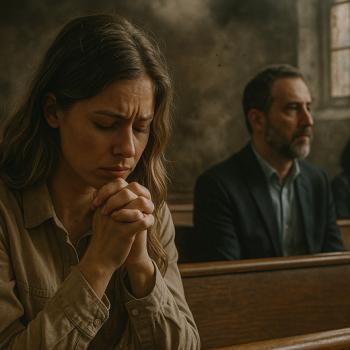Google "Brian McLaren heretic."
You'll get 35,000 hits in less than half a second.
Brian McLaren is considered a false teacher and a heretic by many Christians because his theology propounds a more inclusive faith (see his classic book A Generous Orthodoxy), a less fear-filled faith, a faith more willing to live with some mystery, a faith unwilling to claim so many things as essential to salvation.
And some people hate him for it.
For over a decade (certainly since the publication of his A New Kind of Christian), Brian has been vilified, demonized, attacked publicly and privately. He has received emails, letters, and phone messages that would frankly scare the shit out of you if they showed up in your own inbox.
And he has gone on, this pastor, writer, and activist, living, loving, and proclaiming what he understands to be the Good News of Christ Jesus because he has seen the transformation in his own life and the lives of those he has served.
Brian was actually a part of my own faith journey. Our mutual friend Chris Seay asked me to read the manuscript for A New Kind of Christian, to offer Brian some pointers about storytelling. Chris knew I would not be offering pointers about theology because he knew that I didn't much like Christianity as I'd seen it manifested.
But here's what happened: I took on the gig as a paying job, and something happened to me far more important than a paycheck. Although I was not converted (or re-converted) by the simple experience of reading that book, it was a part of a long journey for me, a journey that led me back to faith.
I had not realized you could be a Christian in a way that was not fear-filled, judgmental, all about rules and knowing you were right and somebody else was going to burn forever in the Lake of Fire.
Brian McLaren was a Christian voice I was willing to listen to when I thought I was unwilling to listen to Christian voices.
And for that, I will always be thankful to him.
Spirit moves in a mysterious way, and God calls to us in different voices.
God did not speak to me in the Assembly of God tradition of my paternal grandparents, or in the Southern Baptist tradition of my parents, or in the United Methodist Church of my maternal grandparents.
Does that make them wrong?
Does that mean their pastors are heretics, or false teachers, or stupid?
No. Of course not. We might (nay, do) disagree about details.
But those traditions have been life-giving to members of my family and to others in the same way that the Episcopal Church has been life-giving to me.
And surely, surely, we can agree that Jesus is our Lord and Savior, that he has rescued us all from death and despair and made our lives worth living.
That young woman on the University of Texas campus would have talked to me all night. She was that sure I was wrong and she was right.
But a lot of other people wanted to talk to me (several of whom, incidentally, wanted to ask about the Episcopal Church), and I knew that neither of us was going to change our minds, and so I drew our conversation at last to a close.
"It's clear that we read the Bible differently," I told her, "and that we exercise our faith differently. But please, pray for me. I will pray for you. And together, we'll try and muddle through."
She pursed her lips. It was not the conclusion she had imagined to her disagreement.
But she had the grace to nod, and to take my hand again as we parted, and I'll bet she has prayed for me.
Often.
As I pray for her.





